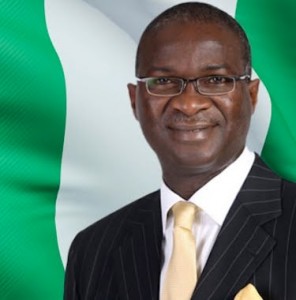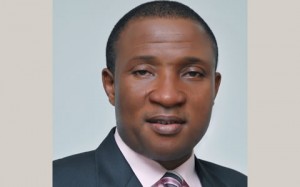Global warming, an offshoot of the climate change phenomenon, is being transformed from a threat of environmental doom to a promise of financial boom, thanks to a range of emerging profit-spinning prospects.
As the unsavoury impacts of climate change persist on one hand, the positive side, on the other hand, is throwing up numerous opportunities for investors.
“It doesn’t mean we are celebrating climate change or advocating increasing emissions! Responding to your opportunities might mean helping others to reduce their own vulnerability to extreme weather or other impacts of a changing climate,” said a source.
But the Lagos State Government, at the Sixth Edition of its Annual Climate Change Summit, is giving this picture a closer look. The summit has “Exploring Business Opportunities in Climate Change: Lagos State in Focus” as its theme and will hold from 18th to 20thMarch 2014 at the Eko Hotel & Suites, Victoria Island, Lagos.
In what appears to have become a tradition, state authorities are once again confronting the climate change challenge, albeit via a yearly forum that has received global acclaim.
Last year, the 5th Lagos Climate Change Summit held from March 13th to 15th and examined: “Vulnerability and Adaptability to Climate Change in Nigeria: Lagos State Transportation, Housing and Infrastructure in Focus.”
Previous events held 24th to 26th March, 2009; 4th to 7th May, 2010; 8th to 10th February, 2011; and 12th to 14th April, 2012.
While the 2009 maiden event had “Reclaiming the Environment: Challenges and Consequences of Climate Change” as its theme, the follow-up in 2010 discussed: “Trans-boundary Effects of Climate Change.” Further, while the 2011 summit focused on: “Charting a Road Map for Combating Climate Change in Nigeria”, the gathering in 2012 explored issues related to: “Vulnerability and Adaptability to Climate Change in Nigeria: Lagos State Agriculture, Industry and Health Sectors in Focus.”

All past Climate Change Summits – as well as the upcoming one – have held under the tenure of Governor Babatunde Raji Fashola, who seems committed to tackling the global environmental scourge in general and the unsavoury impact of the climate change phenomenon in Lagos in particular.
“Gone are the days when we could succinctly draw a line between the rainy season and dry season; gone are the days when harvest was predictable and bountiful; gone are the days when select species of certain fish were readily available on the menu table,” the governor observed in 2009 at the maiden Lagos Climate Change Summit.
Subsequent events have proved him right as, for example, when the weather went haywire on July 10, 2011. The heavens suddenly opened up and, for 16 hours non-stop, Lagos experienced a torrential rainfall that was unprecedented in the history of the state. The memory still lingers on in the minds of Lagosians.
Then on February 13, 2012, an unprecedented storm with wind speed hovering between 75km and 100km befell the bustling city, damaging numerous homes and several properties.
Curiously, the rainstorm occurred in the middle of February, a month not usually associated with such an extreme weather condition.
However, for the first time in the history of the summit, participants are brainstorming on the “positive” – albeit the business – aspect of the phenomenon, which has seen investors jostling for a piece of the multi-billion-dollar global carbon market.
Valued at a whopping N170 billion, the increasingly lucrative industry has become the beautiful bride and indications are that participants at the 6th Lagos Climate Change Summit will attempt to steer Nigeria in the right direction towards becoming an active player.
Nonetheless, Nigeria is currently operating several Clean Development Mechanism (CDM) projects approved by the United Nations Framework Convention on Climate Change (UNFCCC).
One of such is the Lagos State Government’s Municipal Solid Waste (MSW) Composting Project in Ikorodu. It was registered December 2010 with the UNFCCC and operated by EarthCare Nigeria Limited.
Similarly, the state’s Waste Management Authority (LAWMA) at its Olushosun Landfill Site at Oregun is turning waste to wealth by curbing carbon emission and producing gas from wastes.
National and state officials are also involved in the promotion of the Save80 Fuel Efficient Wood Stove, which reduces by 80 percent the amount of wood needed for cooking, thereby keeping the carbon sink and slowing the rate of desertification.
Other CDM projects, which entail the gathering and use of hitherto flared associated gas, are:
1. Recovery of Associated Gas at the Kwale Oil-Gas Processing Plant, owned by AGIP;
2. Pan Ocean Gas Utilisation Project in Ovade-Ogharafe; and,
3. Asuokpu-Umutu Marginal Field Gas Recovery Facility, owned by Platform Petroleum.

Lagos State Environment Commissioner, Tunji Bello, submitted that past summits have produced a wide range of recommendations which, upon their implementation, have helped to advance the state’s adaptation and mitigation capabilities to the impact of climate change.
He said: “For instance, government a couple of years ago declared July 14 of every year as Tree Planting Day in the state. It came under a programme aimed at planting millions of trees to beautify Lagos and also provide a carbon sink. Over 6 million trees have so far have been planted.
“Similarly, the government has established the Lagos State Parks and Gardens Agency (LASPARK) to beautify and regenerate the Lagos environment from the effect of climate change, in the light of the intensity of global warming that is threatening the entire ecosystem. The agency’s effort at establishing gardens and parks all over Lagos has placed her among the notable green cities in the world today.
Speaking on the idea behind business opportunities in climate change, he added: “There is likely to be an increasing demand for products and services designed to function in the new climate. For example, products that are heat resistant, robust, waterproof, moisture retaining or made from permeable material.
“Also, there are likely to be market opportunities for new or existing products or services that help others deal with the climate risk. For example, by providing products or services that monitor or measure weather or impacts.”
